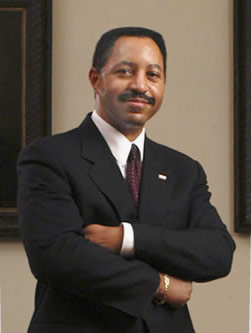Last week, approximately 80 percent of the faculty at Indiana University of Pennsylvania voted they have no confidence in IUP President Tony Atwater. The results of the vote were released Dec. 18 by IUP’s chapter of the Association of Pennsylvania State College and University Faculties who called for the vote in November.
“This development is unfortunate but not surprising,” said Atwater. “I earlier extended an invitation to IUP APSCUF’s leadership to meet and pursue possible ways of resolving differences. However, the faculty union chose not to respond to my invitation.”
| TONY ATWATER |
Of the 777 faculty members who were eligible to vote, 672 participated with 568 expressing no confidence, 64 expressing confidence, and 40 abstaining.
IUP’s faculty union released a list of grievances against Atwater last month, urging the entire faculty to vote no confidence in the president. At the top of their list was concern over centralization of the university’s budget and a desire to reclaim shared governance at the university.
“The very difficult economic times that (Pennsylvania State System of Higher Education) universities are facing have and will require difficult and sometimes unpopular decisions in serving the vital needs and interests of system universities,” Atwater said. “I have made several such decisions over the current academic year, and I have made these decisions in recognition and respect of the principle of shared governance.”
Overall, the faculty union said the president has shown poor decision-making and his leadership style has led to low campus morale. Among many others, they specifically criticized the president’s excessive hiring of consultants, excessive spending on his personal residence, inability to meet fund raising goals, and refusal to meet with faculty and student groups without preconditions.
“The issues noted in the faculty union’s rationale for its vote are, on the whole, inaccurate and misleading,” Atwater said. “For example, the union’s “bill of particulars” includes an accusation that vacant faculty lines this semester have been frozen. This claim is untrue and has been acknowledged as such by the faculty union’s leadership in a recent meeting with Provost Gerald Intemann and me.”
In response to the vote, Atwater released a list of his administration’s achievements over the five years he served in office. This included the university’s $270 million residential initiative, establishment of the Center for Civic Engagement and Student Leadership and creation of a new scholarship for international study.
“Preserving and strengthening academic quality at IUP, in service to our students, will continue to be my top priority as president. This will be the case even in times of economic adversity, such as we face today,” Atwater said. “Academic excellence and student success must and will drive our mission and priorities now and in the future. And I am confident that the IUP community will work collaboratively to this end.”
Over the past 30 years, Atwater said three of IUP’s last four presidents, serving more than one year in office, have received votes of no confidence from the faculty union. Presidents at other PASSHE universities have also received votes of no confidence in the past, but this did not necessarily lead to the end of their tenure.
The PASSHE board of governors, who are responsible for hiring and managing the contracts of all university presidents, have not indicated what action, if any, will be taken in relation to the vote.
“We’re aware of the vote but at this point there’s not going to be anyone who’s going to comment on the vote,” said PASSHE spokesman Kenn Marshall. “There’s no indication of what or when they’re going to discuss this.”
On Dec. 21 Atwater also announced he would take a medical leave for the month of January as he was recently diagnosed with pancreatic cancer.
